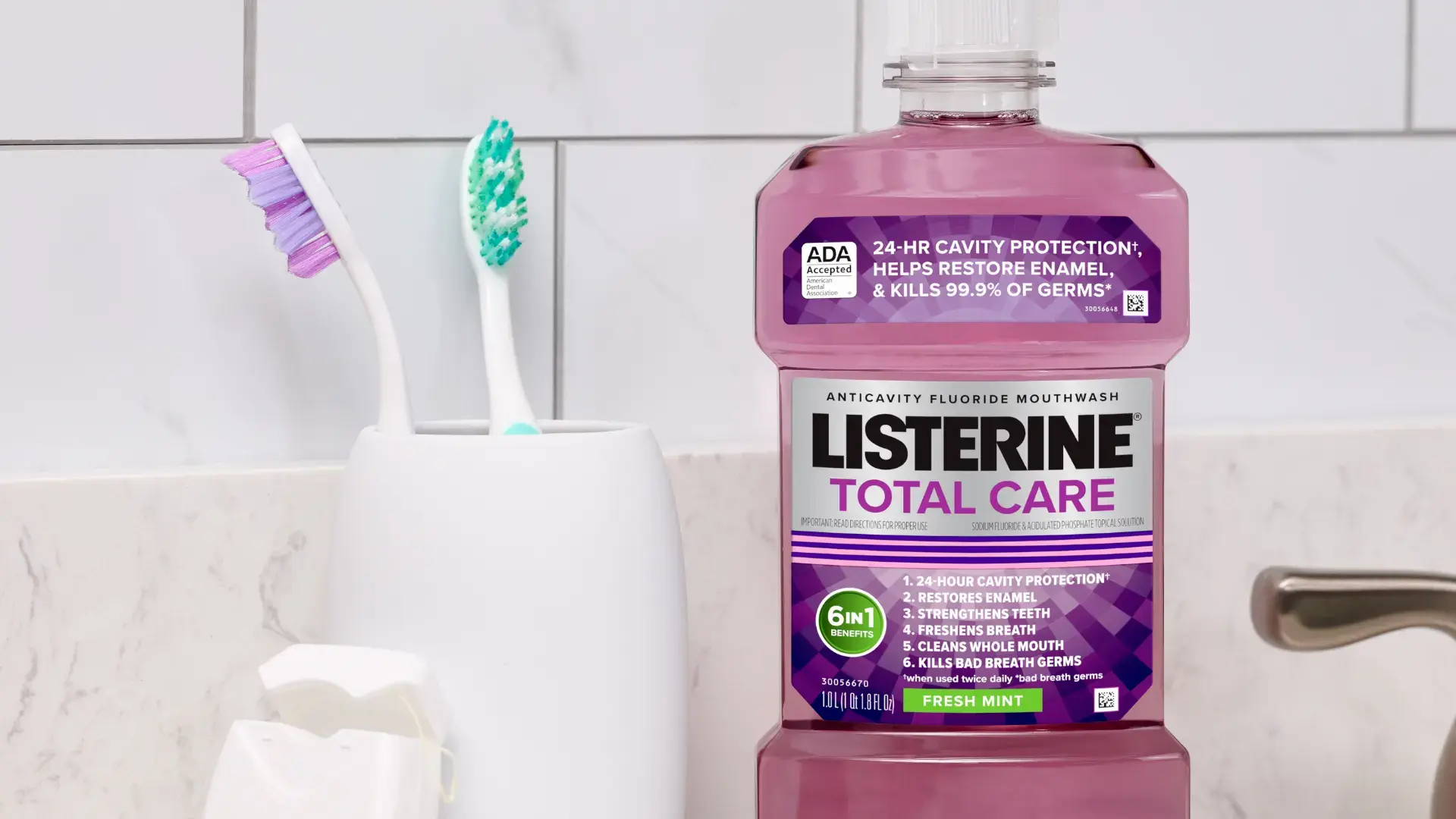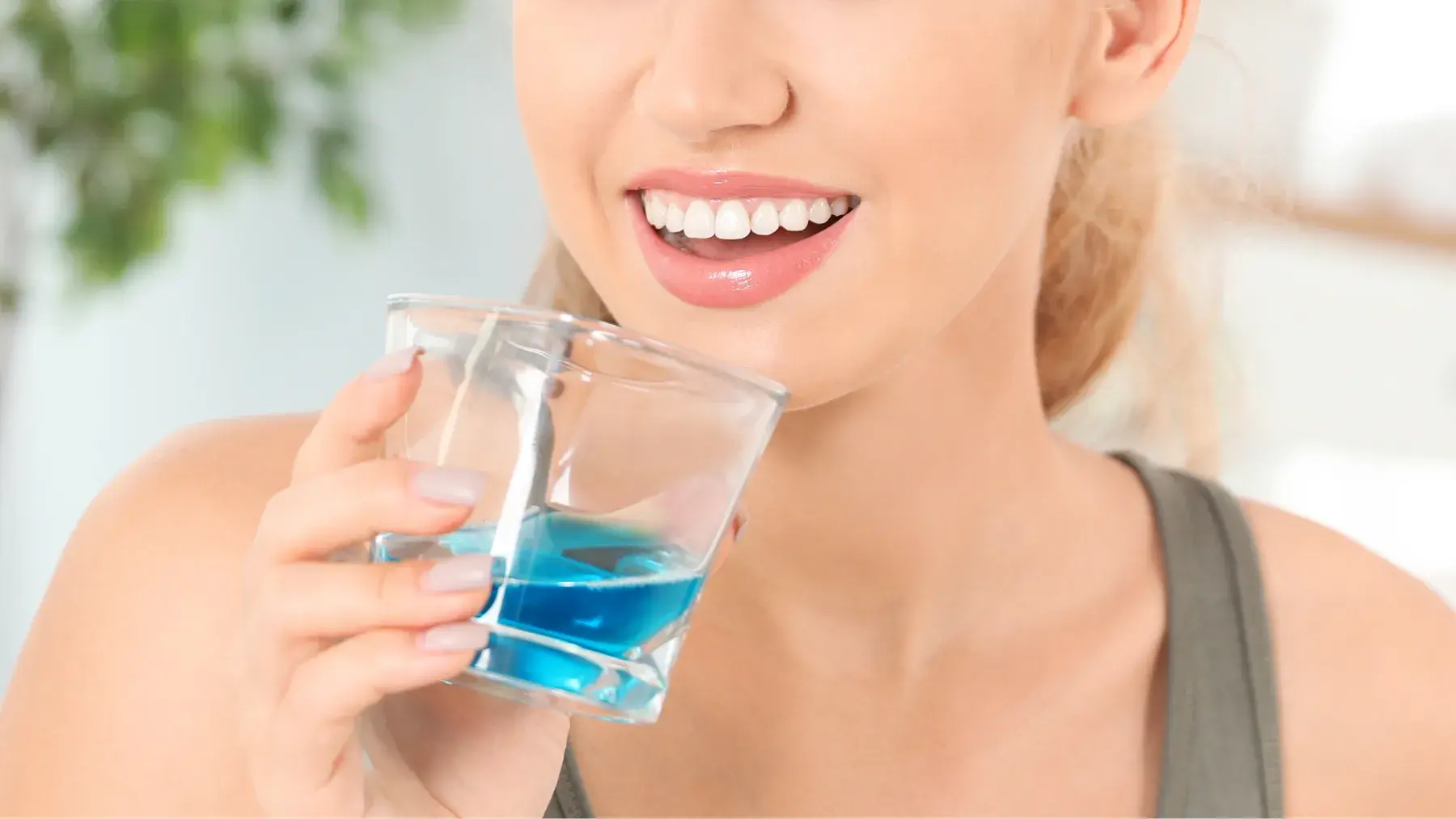Understanding Mouthwash with Alcohol
Alcohol is a commonly used inactive ingredient in mouthwash as a preservative and also a carrier for some active ingredients.1 The active ingredients that may be used in mouthrinses include cetylpyridinium chloride, essential oils, and fluoride, serving to help reduce bad breath, control plaque and gingivitis, and prevent dental decay.2 Alcohol enables the four essential oils to quickly penetrate plaque biofilm and to help shift the oral microbiome to a healthier state.3
How Much Alcohol Is in Mouthwash?
The alcohol content in a mouthwash can vary between brands and types, but it typically ranges from 14% to 27% by volume.6 For instance, the LISTERINE® Antiseptic Mouthwash COOL MINT® mouthwash contains 21.6% alcohol. You may refer to the product label or the manufacturer's website to learn the exact alcohol content of a mouthwash.
Is Alcohol In Mouthwash Bad?
Alcohol in mouthwash is not inherently bad. It serves a functional role dissolving active ingredients like essential oils for plaque and gingivitis efficacy.5 Unlike consuming alcoholic beverages, the alcohol in mouthwash is not ingested and thus does not have the systemic effects associated with drinking alcohol.
However, there are downsides to mouthwashes with alcohol:
Burning Sensation: Some individuals experience discomfort or a burning sensation in the mouth when using alcohol-based mouthwashes.7
Contraindications: Alcohol-based mouthwashes may not be recommended for children, individuals with a history of alcohol addiction, those of certain religious beliefs.1
Why Choose Alcohol-Free Mouthwash?
Alcohol-free mouthwashes provide an important option for maintaining good oral health, particularly for those who may have reasons to avoid alcohol. These mouthwashes rely on a variety of active ingredients to ensure a clean and healthy oral environment. Alcohol free mouthwashes are used for their antimicrobial properties, helping to prevent bad breath. Fluoride is another common component of mouthwash, added to strengthen tooth enamel and help prevent decay.2 For a comprehensive list of ingredients and their benefits in mouthrinses, you may go to the Listerine ingredients page.
Someone should choose an alcohol-free mouthwash over an alcohol-containing one if they have a history of alcohol abuse or prefer not to have the intense sensation associated with alcohol-based mouthwashes. Additionally, alcohol-free mouthwashes are often recommended for children under 12 and people of certain religious beliefs that restrict the use of alcohol.1
Is Alcohol-Free Mouthwash Better?
The decision to use alcohol-free mouthwash is ultimately dependent on individual oral care needs and preferences. They suit individuals with sensitive mouths, a history of alcohol addiction, or certain religious beliefs that discourage alcohol use, as well as those who prefer a milder taste.1
However, it is important to remember that both alcohol-containing and alcohol-free mouthwashes have their own benefits. Seeking a personalized recommendation from a dental practitioner is always advisable, as they can offer guidance based on your specific oral health needs.
Does Listerine Have Alcohol?
Yes. Listerine’s product includes both alcohol-containing and alcohol-free mouthwashes for different preferences and oral health requirements. The alcohol-containing mouthwashes come with a variety of different options that target different dental issues. For example, the Antiseptic Mouthwashes help kill germs that lead to bad breath, plaque and gum disease. The Cavity Prevention Mouthwashes contain fluoride, helping prevent cavities, restore mineral to the tooth’s surface and strengthen teeth.
Alcohol-Free Listerine Mouthwashes
Besides alcohol-containing options, Listerine also offers Zero Alcohol Mouthwashes that are designed to be milder while still offering effective protection against bacteria and promoting oral health. Additionally, Listerine provides Kid-Friendly Mouthwashes that are alcohol free and have flavors that encourage children to develop good oral hygiene habits. For more information on the specific products and their benefits, you can visit Listerine's product page.
References
Lynch MC, Cortelli SC, McGuire JA, et al. The effects of essential oil mouthrinses with or without alcohol on plaque and gingivitis: a randomized controlled clinical study. BMC Oral Health. 2018;18(1):6. doi:10.1186/s12903-017-0454-6
ADA. Mouthrinse (Mouthwash). Retrieved from: https://www.ada.org/resources/research/science-and-research-institute/oral-health-topics/mouthrinse-mouthwash
ListerineProfessional. Alcohol in Mouthwashes & Rinses. Retrieved from: https://www.listerineprofessional.com/the-science-of-listerine/evidence-of-safety/role-of-alcohol
Valley Creek Dental Care. Alcohol vs. Alcohol-Free Mouthwash: Know The Difference. Retrieved from: https://valleycreekdentalcare.com/blog/2021/6/11/alcohol-vs-alcohol-free-mouthwash-know-the-difference
Healthfully. What Is the Content of Alcohol in Mouthwash? Retrieved from: https://healthfully.com/content-alcohol-mouthwash-8700247.html
Healthline. Is Mouthwash Bad for You? Effects, Risks, Who Should’t Use It. Retrieved from: https://www.healthline.com/health/dental-and-oral-health/is-mouthwash-bad-for-you
Werner CW de A, Seymour RA. Are alcohol containing mouthwashes safe? Br Dent J. 2009;207(10):E19-E19. doi:10.1038/sj.bdj.2009.1014




